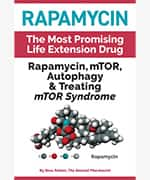Life Extension Magazine®
As progress in longevity science continues to accelerate, researchers are investigating three innovative strategies that can delay aging, reduce disease, and increase lifespan.
Rapamycin, mTOR, and autophagy are at the forefront of the life extension revolution.
In this interview, Life Extension discusses these advances with pharmacist Ross Pelton, author of the book, Rapamycin, mTOR, Autophagy & Treating mTOR Syndrome.
LE: Ross, there’s been a lot of “buzz” lately about rapamycin, an FDA-approved drug used to prevent organ transplant rejection and treat certain cancers.1 Why are people so excited?
Pelton: What has fascinated the scientific community is rapamycin’s ability to increase median life expectancy in animal models by up to 60%. The hope is that humans may gain significant improvements in health and increases in lifespan by taking rapamycin.
In addition, a clinical trial in elderly adults 65 years and older revealed that once-weekly dosing of everolimus (a rapamycin derivative with properties virtually the same as rapamycin) strengthened their immune system, evaluated by their enhanced response to influenza vaccine of about 20%.2 This study is important because the immune system in all elderly people has declined significantly compared to the immune function of healthy adults in their 20s and 30s. The ability of rapamycin-like drugs to enhance the immune system in elderly adults is a major outcome.
LE: You said rapamycin can increase life expectancy by up to 60% in animals. Can you discuss that in more detail?
Pelton: When rapamycin therapy was initiated in middle-aged mice, median increases in life expectancy of up to 60% were observed.3 When rapamycin therapy was initiated in elderly male and female mice that were roughly the equivalent of 60-year-old humans, female mice achieved a 14% increase in lifespan and males achieved a 9% increase in lifespan.4 This may equate to an increase of more than seven years of human life.5
LE: How does rapamycin work?
Pelton: Over the past 25 years, research into rapamycin’s mechanism of action has resulted in the discovery of a new understanding of cellular biology and the aging process. This research has revealed that mTOR and autophagy regulate the health and aging process of all living organisms.
Rapamycin inhibits mTOR and enables the process of autophagy to be activated, which restores youthful metabolic functions. Research reveals that rapamycin delays the onset of many age-related diseases that apply to human health.6
In my mind, the mTOR/autophagy story is even more important than rapamycin. The understanding of mTOR and autophagy is revealing how we can delay the onset of age-related diseases and achieve significant increases in lifespan and healthspan.
LE: Can you explain what mTOR is for our readers?
Pelton: When calories are available to a cell, the protein mTOR sends signals that activate cellular metabolism, telling the cell to use the available calories to build new proteins, new enzymes, fat stores, and other cellular components. When mTOR is activated, it initiates anabolic (building) processes of cell growth and proliferation.
LE: And what is autophagy?
Pelton: Autophagy is the process in which damaged proteins, excess fat, and other worn cellular components are broken down for reuse or elimination. Autophagy has been referred to as the cellular housekeeping process or cellular trash removal. The problem is that chronically activated mTOR (caused by relentless calorie ingestion) precludes healthy autophagy.
LE: Is that a serious problem?
Pelton: Very. Throughout 99.9% of mankind’s evolution, people did not eat three meals per day. However, these days, refrigeration and the widespread availability of processed and packaged foods have resulted in food being easily available all the time. Modern humans spend far more time eating compared to our ancient ancestors.
This results in constant over-activation of mTOR and insufficient functioning of autophagy. This imbalance is a major contributing factor underlying today’s epidemic of health problems, such as cancer,7 obesity,8 and type II diabetes.9 I’ve chosen to call this condition “mTOR Syndrome”.
LE: How can people correct this imbalance? With intermittent fasting?
Pelton: Even aggressive fasting does not always induce meaningful reductions in body fat. Many individuals need additional support with compounds that induce beneficial autophagy. Rapamycin is a leading candidate. By inhibiting mTOR, rapamycin mimics calorie restriction and fasting.
LE: Does that mean rapamycin can help with weight loss?
Pelton: Yes. Research indicates that rapamycin may reduce fat mass and body weight as seen in cell and animal studies.10 And favorable findings from pilot studies in older people have prompted formal clinical trials to evaluate the anti-aging effects of rapamycin, including the ability to improve cardiac function11 and reduce visceral adiposity.12
At this point, clinical trials have not yet been completed to determine how effective rapamycin might be as a drug to induce weight loss in humans. However, I will share my personal experience. In six months of taking rapamycin, I lost 15 pounds and noticed a substantial reduction in the “love handles” around my waist.
LE: What dose is optimal for weight loss?
Pelton: There may be up to 1,000 mTOR sites within each cell. When rapamycin is taken, it enters cells and binds to some of the mTOR sites, which results in partial inhibition of mTOR. The degree of mTOR inhibition is dose dependent. This is a critically important point. Some people may need to take higher doses of rapamycin to optimize the effect on mTOR and autophagy. One clinical trial is studying 5 mg and 10 mg weekly doses of rapamycin and using imaging scans before and after to measure how much visceral fat may be reduced.12
LE: What is the most common dose being used by those seeking rapamycin’s potential longevity benefits?
Pelton: Pioneering physicians are discovering that taking 5-6 mg of rapamycin just once weekly partially inhibits mTOR. This enables autophagy to be expressed on a periodic basis, which provides a wide range of health benefits. When mTOR and autophagy are optimally balanced, every cell in the body can experience detoxification, renewal, and revitalization. Everything begins to work better.
Taking rapamycin for life extension is a very new field of science, so studies to determine the best dosage and frequency have not been conducted. Many life extension enthusiasts are self-experimenting by taking 5-6 mg once weekly. Eventually, lab tests to determine plasma levels of rapamycin will be readily available, which will help determine the best dose and frequency of taking rapamycin for each individual.
LE: At what age do you recommend people start taking rapamycin?
Pelton: This is a personal decision for everyone. However, I can offer some guidelines. mTOR is a master regulator of the growth activities in cells. Childhood, adolescence, and even young adulthood are periods of rapid growth. Hence, it would be inappropriate to have young people taking rapamycin. Although there is no agreed-upon age for people to start taking rapamycin, I don’t think people younger than 30 should.
LE: Can elderly people take rapamycin safely?
Pelton: Yes, but as the study of mice showed, the increase in life expectancy was greater when rapamycin was initiated in middle-aged mice. While we eagerly await results from ongoing human rapamycin studies, delays in suppressing excess mTOR and inducing autophagy may diminish the longevity-enhancing benefits.
LE: You mentioned that you take rapamycin. When did you start?
Pelton: I started taking 6 mg of rapamycin once weekly in June 2021. I had blood drawn for routine lab work in November 2021 and discovered that I was anemic. My red blood cell count, hemoglobin, and iron levels were below normal and my lymphocyte count was slightly low, which is an indicator of immune status. Based on my lab values, I reduced my rapamycin intake to 6 mg every other week. I rechecked my labs a month later and everything had returned to normal.
Why was 6 mg of rapamycin too high a dose for me? In addition to rapamycin, I engage in intermittent fasting most days, I exercise regularly, I take metformin twice daily and I take Life Extension® Senolytic Activator®. Based on the multiple components of my life-extension program, I discovered that taking 6 mg of rapamycin every other week is the best dose for me.
LE: Are there natural ways that people can inhibit mTOR and increase the expression of autophagy?
Pelton: Yes, there are. Remember, autophagy is activated when calories are unavailable. Intermittent fasting and time-restricted eating refer to eating protocols in which all your daily food is consumed within a shorter period of time. One of the most popular versions is the 16:8 protocol, in which all your food is consumed within an eight-hour period, say from noon to 8 p.m. This leaves 16 hours (from 8 p.m. until noon the following day) of fasting, which enables autophagy to be activated.
LE: Do you go into greater detail about all this in your new book?
Pelton: Yes. I want to emphasize that decades of research on rapamycin’s mechanisms of action have resulted in a revolutionary new understanding of cellular metabolism, health, and the aging process.
My book, Rapamycin, mTOR, Autophagy & Treating mTOR Syndrome, reviews the history and scientific studies that explain rapamycin’s ability to improve health and delay the onset of age-related diseases. It also discusses alternatives to rapamycin for those who cannot find a physician willing to write them a prescription for rapamycin, and for people who want to wait for the results of clinical trials before initiating this medication.
My book also provides practical guidance on how to improve the mTOR/autophagy ratio, which holds the promise of increasing both healthspan and lifespan.
LE: Is there any new research that documents rapamycin’s effectiveness as a life extension drug?
Pelton: Yes, I want to report the exciting results from a study conducted by Dr. Vera Gorbunova, who is Co-Director of the Rochester Aging Research Center. Long-lived animals are known to have genes in common that negatively and positively affect lifespan. Dr. Gorbunova examined 10 prominent life extension therapies in mice and assessed how each intervention affected the genes associated with maximum lifespan. The interventions evaluated were rapamycin, 17-alpha-estradiol, pituitary-specific positive transcription Factor 1 (PiT1), growth hormone, rilmenidine, ascorbyl-palmitate, acarbose, calorie restriction, methionine restriciton and protandim.
RAPAMYCIN WINS: Rapamycin had the greatest effect in reducing the activity of genes that have a negative effect on maximum lifespan AND, rapamycin also had the greatest effect at promoting the activity of genes that have a positive effect on maximum lifespan. This study provides powerful confirmation that rapamycin is a life extension drug that is ushering in a revolution in life extension and healthy aging.
If you have any questions on the scientific content of this article, please call a Life Extension Wellness Specialist at 1-866-864-3027.
References
- Available at: https://www.uptodate.com/contents/pharmacology-of-mammalian-mechanistic-target-of-rapamycin-mtor-inhibitors. Accessed March 14, 2022.
- Mannick JB, Del Giudice G, Lattanzi M, et al. mTOR inhibition improves immune function in the elderly. Sci Transl Med. 2014 Dec 24;6(268):268ra179.
- Bitto A, Ito TK, Pineda VV, et al. Transient rapamycin treatment can increase lifespan and healthspan in middle-aged mice. Elife. 2016 Aug 23;5:e16351.
- Harrison DE, Strong R, Sharp ZD, et al. Rapamycin fed late in life extends lifespan in genetically heterogeneous mice. Nature. 2009 Jul 16;460(7253):392-5.
- Blagosklonny MV. Rapamycin for longevity: opinion article. Aging (Albany NY). 2019 Oct 4;11(19):8048-67.
- Selvarani R, Mohammed S, Richardson A. Effect of rapamycin on aging and age-related diseases-past and future. Geroscience. 2021 Jun;43(3):1135-58.
- Hua H, Kong Q, Zhang H, et al. Targeting mTOR for cancer therapy. J Hematol Oncol. 2019 Jul 5;12(1):71.
- Yang SB, Tien AC, Boddupalli G, et al. Rapamycin ameliorates age-dependent obesity associated with increased mTOR signaling in hypothalamic POMC neurons. Neuron. 2012 Aug 9;75(3):425-36.
- Yang L, Zhang Z, Wang D, et al. Targeting mTOR Signaling in Type 2 Diabetes Mellitus and Diabetes Complications. Curr Drug Targets. 2022 Jan 11.
- Ro SH, Jang Y, Bae J, et al. Autophagy in Adipocyte Browning: Emerging Drug Target for Intervention in Obesity. Front Physiol. 2019;10:22.
- Available at: https://clinicaltrials.gov/ct2/show/NCT04996719. Accessed March 15, 2022.
- Available at: https://clinicaltrials.gov/ct2/show/NCT04488601. Accessed March 15, 2022.
Ross Pelton is a pharmacist, a clinical nutritionist and the author of 12 books on topics on a variety of health topics.
Ross’ website, bio and blog are at: www.naturalpharmacist.net
For full description and to order Rapamycin, mTOR, Autophagy and Treating mTOR Syndrome, call 1-800-544-4440 or visit www.LifeExtension.com/rapa
Item # 34189 • $14.95






